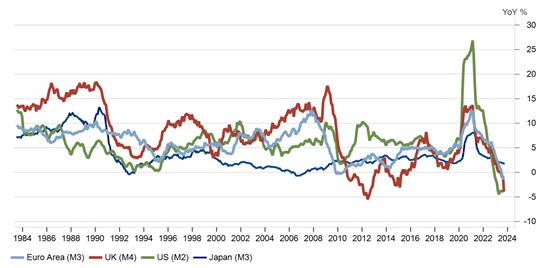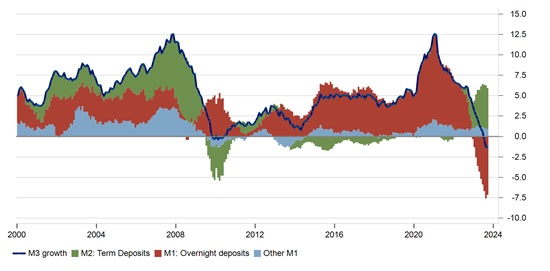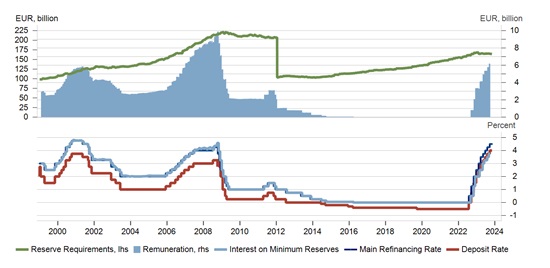Announcements
Drinks

Credit Lines: why money markets matter

After more than a decade of expansion, money supply is once again becoming scarce as central banks tighten their policies. The euro area’s broad money supply (M3) contracted for the first time in the single currency’s short history, dropping by 1.2% in September compared with the same month the year before. Related money supply gauges at the Federal Reserve (M2) and the Bank of England (M4) declined by almost 4% over the same period. This is entirely consistent with the desired stance of today’s monetary policy and the transmission of monetary policy through the credit channel.
Global money supply is shrinking in line with central banks’ tight policy stance

Source: National Central Banks
As always, financial intermediaries find themselves in the middle, benefitting from rising margins while lending volume declines. However, those margins are coming under pressure because depositors are switching from sight to higher-yielding term deposits or parking their liquidity with money-market funds, notably in the US. For example, within euro area M3, unremunerated sight-deposits fell sharply as depositors switched to higher-rate term deposits.
Monetary tightening leaves banks fighting for a shrinking overall deposit pool, thus accelerating the repricing of their liabilities for as long as interest rates remain high. The end of generous central bank funding schemes such as TLTROs adds additional pressure, prompting banks to tap more expensive wholesale funding in 2023 to maintain their liquidity ratios. Faced with rising deposit rates, banks may choose to raise yet more wholesale funding in 2024.
Euro area depositors switch into higher-yielding term deposits

Source: ECB
Unlike previous episodes of monetary tightening, central banks entered this cycle with record high balance sheets due to quantitative easing. While these assets are slowly running off or getting sold through open market operations in the case of the Bank of England, central banks face the increasing cost of implementing their policies, paying rising amounts of interest on bank reserves and government deposits to ensure policy rates are transmitted through money markets.
To reduce interest expenses, the ECB abolished interest on minimum reserves from September, equivalent to an annualised cost for the banking sector of EUR 6bn at current interest rates, an opportunity cost that could double if the ECB were to decide raising banks’ minimum reserve ratio back to 2%, where it was until 2012. That may well be necessary to make money markets more efficient.
Higher minimum requirements create demand for central bank reserves, which would allow the ECB to scale back interest paid on excess reserves. The Swiss National Bank has implemented such a policy recently, albeit with a close eye on overnight money market rates.
Minimum reserve ratios create demand for central bank liquidity

Source: ECB
Uneven distribution of banks’ excess reserves creates headache for ECB
The problem for the ECB is that while banks hold ample excess reserves in the deposit facility in aggregate, these are unevenly distributed across the euro area’s national banking systems. Thus, any change to reserve requirements and their remuneration risks fragmenting monetary transmission and potentially puts pressure on banks’ regulatory liquidity ratios.
Without a functioning interbank lending market, financial conditions would tighten in jurisdictions with low level of reserves and risk loosening in surplus countries if the ECB reduces the interest paid on excess reserves.
Creating the right level of reserve demand and incentives for overnight deposits remains vital for normalising monetary policy in the euro area, for example, by using the corridor between the MRO and the deposit rate where banks exchange overnight deposits among themselves rather than through the ECB.
In the meantime, it is worth watching closely how rising interest rates and shrinking liquidity are pressuring European banks’ balance sheets, including retail funding, as customers seek better remunerated products. As Nicolas Hardy, deputy head of financial institutions at Scope, observes in his latest research:
In the short term, we believe the banks have the capacity to adapt. But for the banks most exposed to this trend, how they respond demands attention. Failure to stabilise the trend could have structural implications on profitability and asset-liability management, including rising loan-deposit ratios and a greater reliance on wholesale funding.
Hardy says that there is very little banks can do to prevent an exodus of deposits.
Deposit repricing has been earmarked as an indicator of fairness and banks have been put under the spotlight for being too slow to adjust rates on deposits. This argument is also being used with a political agenda to justify the taxation of banks’ ‘windfall profits’.
For the full report, please follow this link.






